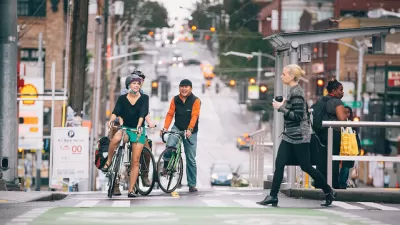As it winds down port operations in the area, Bergen plans to transform its Dokken district from a busy shipping hub to a car-free, 'regenerative' zone.

A coastal district of the Norwegian city of Bergen is preparing to become a zero-emissions neighborhood. As Adele Peters writes, "[t]he project is still in the planning stages, as the city runs workshops to involve residents in the creation of the neighborhood. But a new proposal illustrates what the area, which will include affordable housing, businesses, and other services, might look like."
With much of the land in the area owned by the city, Bergen leaders see this as "the opportunity of the century," a chance "to set high goals for what we want city development to be," says Laura Ve, who leads the development program for the Dokken district. The goal is to create a car-free zone "filled with people on foot and bikes" where "[e]verything is easily accessible based on low-impact mobility" and residents can easily connect to light rail and ferries.
"The design aims to create a 'regenerative' city, not just a sustainable one." The city plans to add new green space to "reconnect the public to the North Sea, with nature-based strategies used to protect the area from flooding caused by heavy storms, heat waves, and sea-level rise." While it's impossible to completely eliminate environmental impacts, the project aims to "find alternatives to fossil fuels in production, capture emissions, and even incorporate emissions into the finished product" for construction materials and "carefully calculate the full life cycle impacts of each decision."
Flemming Rafn, a founding partner at Tredje Natur, the Copenhagen-based architecture firm that worked on the project with designers at Entasis, Matter by Brix, and MOE, says, in addition to reducing carbon emissions, "the new neighborhood can demonstrate how tackling environmental challenges can also improve the local quality of life."
FULL STORY: How to redesign a neighborhood for zero emissions

Maui's Vacation Rental Debate Turns Ugly
Verbal attacks, misinformation campaigns and fistfights plague a high-stakes debate to convert thousands of vacation rentals into long-term housing.

Planetizen Federal Action Tracker
A weekly monitor of how Trump’s orders and actions are impacting planners and planning in America.

In Urban Planning, AI Prompting Could be the New Design Thinking
Creativity has long been key to great urban design. What if we see AI as our new creative partner?

King County Supportive Housing Program Offers Hope for Unhoused Residents
The county is taking a ‘Housing First’ approach that prioritizes getting people into housing, then offering wraparound supportive services.

Researchers Use AI to Get Clearer Picture of US Housing
Analysts are using artificial intelligence to supercharge their research by allowing them to comb through data faster. Though these AI tools can be error prone, they save time and housing researchers are optimistic about the future.

Making Shared Micromobility More Inclusive
Cities and shared mobility system operators can do more to include people with disabilities in planning and operations, per a new report.
Urban Design for Planners 1: Software Tools
This six-course series explores essential urban design concepts using open source software and equips planners with the tools they need to participate fully in the urban design process.
Planning for Universal Design
Learn the tools for implementing Universal Design in planning regulations.
planning NEXT
Appalachian Highlands Housing Partners
Mpact (founded as Rail~Volution)
City of Camden Redevelopment Agency
City of Astoria
City of Portland
City of Laramie





























